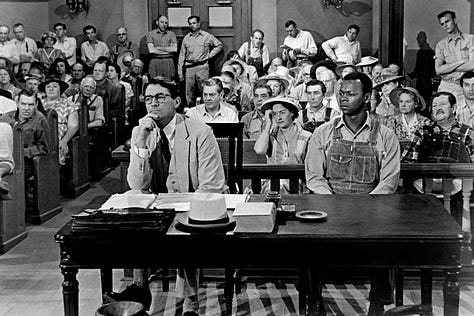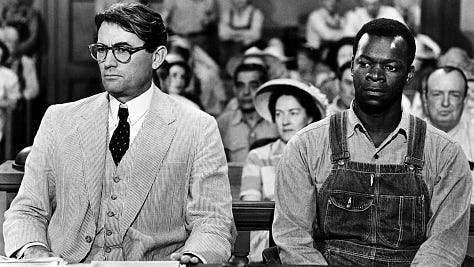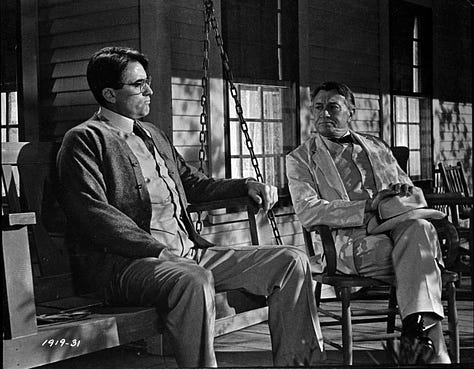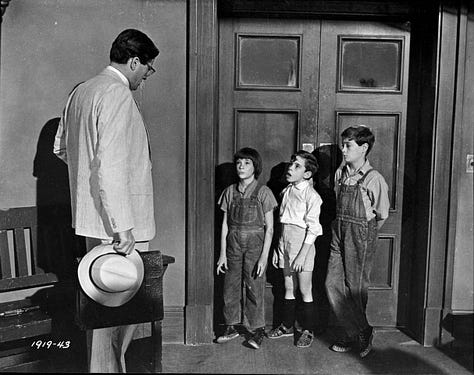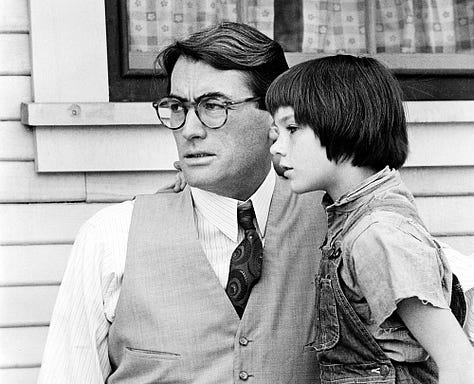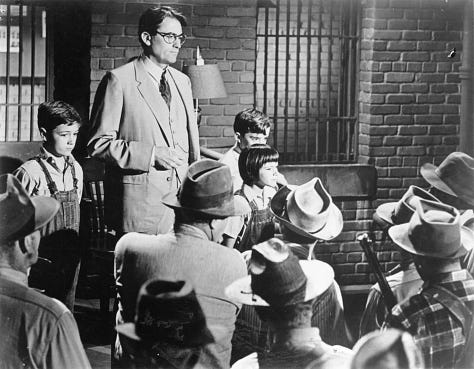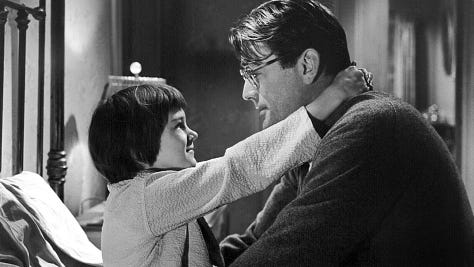TO KILL A MOCKINGBIRD
1962 • Robert MulliganCast: Gregory Peck, Mary Badham, Phillip Alford, Ruth White, Paul Fix, Brock Peters, Frank Overton, James Anderson, John Megna, Rosemary Murphy, Estelle Evans, Robert Duvall, Kim Stanley, Alice Ghostley, Collin Wilcox
Writer: Horton Foote; Based on To Kill a Mockingbird by Harper Lee
Cinematography: Russell Harlan
Music: Elmer Bernstein
Producer: Alan J. Pakula
Universal Pictures
Miss Jean Louise, stand up. Your father's passing.
Based on Harper Lee’s classic novel, To Kill a Mockingbird, set in the racially charged town of Maycomb, Alabama follows Atticus Finch, a lawyer tasked with defending Tom Robinson, a black man falsely accused of raping a white woman, Mayella Ewell. Narrated by Atticus’s young daughter Scout, the film is a coming-of-age story set against the backdrop of Robinson’s trial. The trial becomes a melting pot for the community's deeply rooted racism, despite compelling evidence in Tom's favor. Meanwhile, the children navigate the complexities of morality, racism, and empathy, learning profound lessons about human nature. The film draws a stark contrast between childhood innocence and bigotry's harsh realities.
[[SPOILERS AHEAD]]
To Kill a Mockingbird explores morality, racial injustice, and the complexities of coming of age. Having first read the novel as a middle school student, before seeing the film, I’m fairly certain Robert Mulligan’s adaptation is about as perfect an adaptation from book to screen as there can be. The film's strength lies in its ability to intertwine a coming-of-age tale with a searing commentary on racial prejudice. At its core, the film presents a dual narrative that unfolds through the lens of Scout Finch, portrayed with remarkable authenticity by Mary Badham, offering a unique perspective on the deep-seated prejudices that plague the town of Maycomb. Badham's remarkable performance transcends her age and delivers a portrayal that resonates with sincerity and depth. The coming-of-age aspect of the story is delicately portrayed, capturing the essence of childhood discovery and the loss of innocence. The revelation that there is no Boogeyman down the street becomes a metaphor for the broader realization that the monsters in society are often more insidious and difficult to confront.
Simultaneously, the story explores the pervasive issue of racial injustice. What makes this exploration unique is its portrayal through the eyes of children. The film forces audiences to confront the ugliness of racism as seen by innocent eyes, emphasizing the inherent injustice and absurdity of prejudiced beliefs. The decision to tell the story through a child's eyes renders To Kill a Mockingbird timeless. It’s a mirror reflecting the societal norms that perpetuate injustice. The emotional weight of the film is shouldered by the children, who should be shielded from such harsh realities but are thrust into a world where their father, Atticus Finch, must defend a man who was accused of an abhorrent crime based solely on the color of his skin. By witnessing the events unfold through Scout's experiences, the audience is confronted with the stark reality that racism is a learned behavior, a poison that infiltrates the mind.
Central to the plot is Tom Robinson, portrayed with quiet dignity by Brock Peters. Peters's portrayal of Tom Robinson is a masterclass in subtlety. Through his performance, he breathes life into a character who becomes the embodiment of the devastating impact of systemic racism. The courtroom scenes, where Tom stands accused of a crime he did not commit, are charged with tension, and Peters handles the emotional intricacies with grace. Tom, as we all learned in seventh grade is the metaphor, the mockingbird, an innocent soul destroyed by a society steeped in prejudice. Tom, like the mockingbird, is undeserving of the cruelty thrust upon him. Peters's portrayal ensures that Tom is not reduced to a one-dimensional victim but is presented as a fully realized individual with humanity. Peters's performance elicits a profound sense of empathy. Through his portrayal, the film invites viewers to step into Tom's shoes, or as Atticus puts it: “You never really understand a person until you consider things from his point of view... Until you climb inside of his skin and walk around in it.” He compels you to feel the weight of the unjust accusations and the insurmountable odds stacked against him.
Of course, the heart of To Kill a Mockingbird lies in the character of Atticus Finch, a role immortalized by Gregory Peck in one of the most iconic performances in history. As the moral compass of the film, Atticus stands as a towering symbol of courage in the face of profound adversity. His portrayal is a nuanced representation of resilience, justice, and unwavering compassion. It is deeply rooted in moral integrity. Atticus Finch isn't portrayed as a larger-than-life hero but as a man of principles in a society riddled with racism. Far from being a white savior, his commitment to defending Tom Robinson is not merely an act of heroism but a testament to the belief that everyone deserves a fair trial and an unbiased defense.
Atticus Finch's enduring impact is underscored by the American Film Institute's resounding recognition of Gregory Peck's portrayal as the greatest hero on film. This accolade isn't just a testament to Peck's acting prowess; it signifies the character's profound influence on the collective consciousness. Atticus is a symbol of hope, a reminder that even in the face of seemingly insurmountable odds, one individual should still try to make a difference, even if he fails. In a world still grappling with struggles for justice and equality, Atticus remains an enduring inspiration. His character inspires audiences to confront their own biases and advocate for a more just and compassionate society. Atticus's greatness lies not in grand gestures but in the quiet strength with which he faces the moral quandaries presented by the trial. His commitment to defending Tom Robinson isn't driven by a desire for accolades or recognition; rather, it emanates from a genuine belief in the principles of fairness and equality. This is crystallized in the climactic courtroom scene, particularly in his eloquent summation speech, a moment etched into cinematic history. Remarkably, this scene, lasting over 6 minutes, was captured in a single take. Peck's ability to convey the essence of Atticus's moral fortitude, encapsulating the film's entire thematic core, speaks not only to his exceptional acting prowess but also to the profound connection he felt with the character. The summation speech is a plea for justice. Peck's delivery is measured and resonant, capturing the courtroom's (and the viewer’s) attention. In this singular take, he encapsulates the gravity of the moment, infusing it with emotional intensity.
[[SPOILERS]]
While some critics have occasionally accused both the novel and the film of perpetuating a white savior narrative, this critique overlooks the story’s portrayal of systemic injustice. The story resists the temptation of providing a tidy resolution or a Hollywood ending. Tom Robinson, despite the lack of evidence against him, despite Scout’s expectations, and despite Atticus's impassioned defense, is still found guilty. This outcome challenges the conventional white savior narrative, forcing you to reckon with the inherent systemic racism. In Atticus Finch, the film presents a character who, while embodying moral courage and compassion, is unable to single-handedly dismantle the deeply entrenched racism of Maycomb. He can not save Tom. The narrative refrains from offering a simplistic solution, acknowledging the limitations of one man's efforts against a prejudiced society. Atticus Finch is not a savior in the traditional sense; his heroism lies in his determination to do what is right, even when faced with insurmountable odds. Even when he knows he will likely lose. The guilty verdict for Tom Robinson serves as a stark reminder that, despite Atticus's noble efforts, the unjust result can still happen. The film (and novel) confronts the harsh reality that justice is not always served.
In the name of GOD, do your duty.
Notable Awards & Accomplishments
Academy Award Nominee: Best Picture
Academy Award Winner: Best Actor (Peck)
AFI’s 100 Years… 100 Films: #25
Streaming: Not currently streaming
Digital Rental/Purchase: Available at most major digital retailers
Physical Media: Available on 4K, Blu-Ray and DVD
